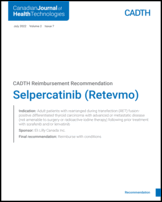|
Initiation
|
| 1. Treatment with selpercatinib should be reimbursed in adult patients with RET fusion-positive DTC with advanced or metastatic disease (not amenable to surgery or radioactive iodine therapy) following prior treatment with sorafenib and/or lenvatinib. | The LIBRETTO-001 trial demonstrated antitumour activity based on the response rates observed with selpercatinib in patients with RET fusion-positive differentiated thyroid carcinoma with advanced or metastatic disease. | Patients who are refractory to radioactive iodine therapy and/or unable to undergo surgery, patients with a contraindication to radioactive iodine therapy, and patients who are intolerant to first-line treatment with lenvatinib should also be considered for selpercatinib treatment; these patients should be screened for somatic RET rearrangements. |
| 2. Patients must have good performance status. | Patients enrolled in the LIBRETTO-001 study had an ECOG PS of 0, 1, or 2. | pERC acknowledged that clinicians may consider using selpercatinib for patients with an ECOG PS > 2 at their discretion. |
|
Renewal
|
| 3. Selpercatinib should be renewed for patients who exhibit a response to treatment, as per physician discretion, and for whom treatment is tolerable. | Based on clinical expert opinion, response would be measured by response rate, PFS, HRQoL, and toxicity. Different measures of response are evaluated based on clinical grounds and radiological examination, general symptoms, and HRQoL. | Patients with documented disease progression could continue selpercatinib if they were deriving clinical benefit. |
| 4. Patients should be assessed for treatment response every 8 to 12 weeks for the first 6 months to 1 year, then every 12 to 16 weeks or as per physician discretion. | Based on clinical group input, response to treatment should be assessed every 8 to 12 weeks for the first 6 months to 1 year, then every 12 to 16 weeks; however, they noted that specific intervals should not be mandated. | — |
|
Prescribing
|
| 5. Selpercatinib should be prescribed by clinicians with expertise in the management of thyroid cancer. | To ensure that selpercatinib is prescribed only for appropriate patients and adverse effects are managed in an optimized and timely manner. | — |
| 6. Selpercatinib should not be reimbursed if given in combination with other systemic anticancer drugs. | Selpercatinib was administered as monotherapy in LIBRETTO-001 and has a Health Canada indication only as monotherapy. | — |
|
Pricing
|
| 7. A reduction in price. | The cost-effectiveness of selpercatinib compared to BSC is unknown. Based on CADTH exploratory analyses, a price reduction of at least 89% would be required to achieve an ICER of $50,000 per QALY relative to BSC. Due to the high degree of uncertainty in the evidence, additional price reduction may be warranted. | — |
|
Feasibility of Adoption
|
| 8. Access to RET testing. | RET testing is needed to identify patients with RET fusion-positive differentiated thyroid carcinoma; however, this may not be equally accessible across all jurisdictions. | pERC agreed it would be desirable for jurisdictions to have RET testing available across Canada to identify the eligible patient population before treatment with selpercatinib. |
